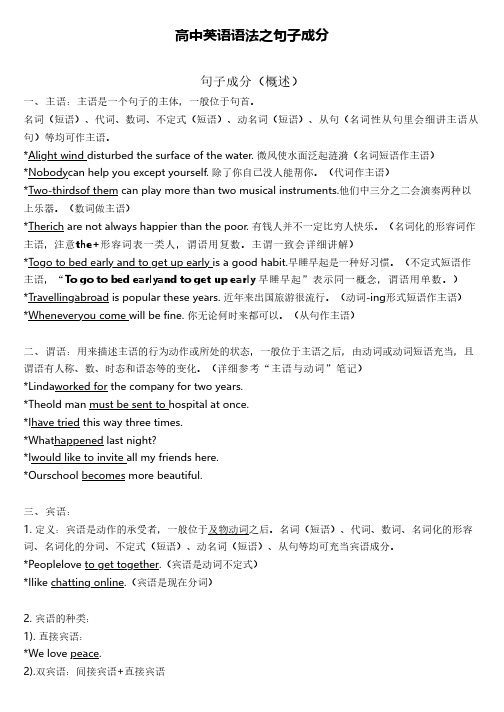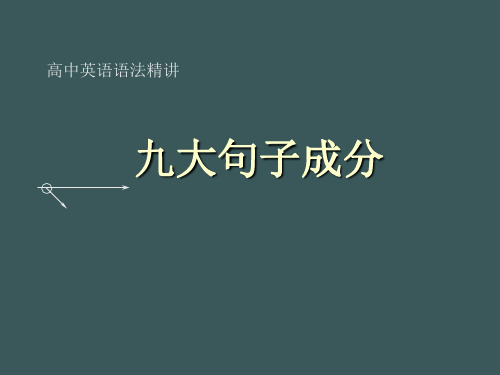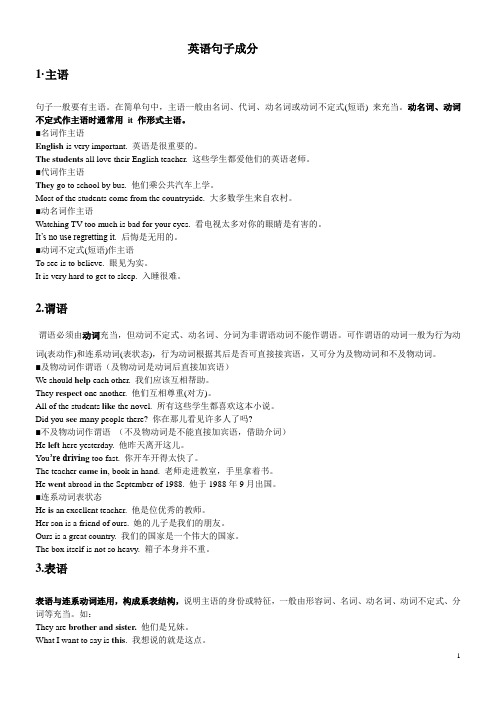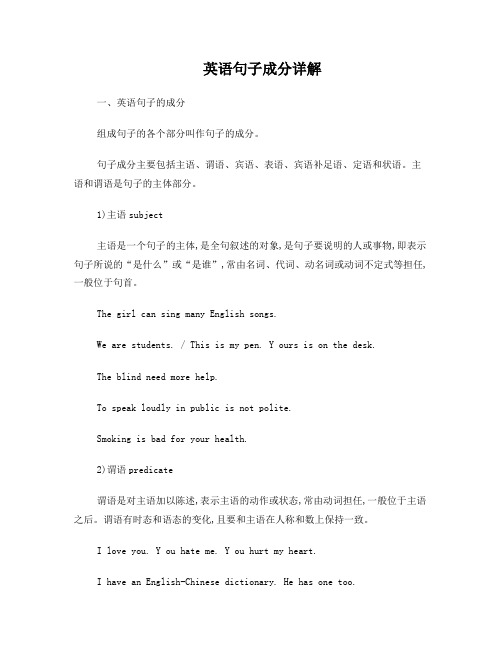高中英语语法精讲:基本句子结构之句子成分
英语语法精讲——句子成份分析

第一讲英语的句子结构步骤一:句子结构的解析一、句子成分一个句子一般由两部分组成,即主语部分(subject group)和谓语部分(predicate group)。
句子成分(members of the sentence)是句子中起一定功用的组成部分。
句子由各个成分所构成。
1.主语主语(subject)是一个句子的主题(theme),是全句所述说的主体,一般置于句首。
可用于作主语的有单词、短语、从句乃至句子。
1)名词作主语 e.g. A tree hasfallen across the road.2) 代词作主语 e.g. You’re not far wrong.3) 数词作主语。
e.g. Three is enough.4)名词化的形容词作主语 e.g. The idle are forced to work.5)副词作主语 e.g. Now is the time.6)名词化得介词作主语 e.g. The ups and downs of life must be taken as they come.7) 不定式作主语 e.g. To find your way can be a problem.8)动名词作主语 e.g. Smokingis bad for you.9)名词化的过去分词作主语 e.g. The disabled are to receive more money.10) 介词短语用作主语e.g. From Yenan to Nanniwan was a three-hour ride on horseback.11) 从句用作主语 e.g. Whenever you are ready will be fine. 12) 句子做主语 e.g. “How do you do” is a greeting.主语可由一个以上的名(代)词等构成,这种主语可叫作并列主语。
e.g. He and I are old friends.英语常用无人称的名词作主语。
高中英语语法句子成分分析 word版

一、句子成分英语句子成分分析和句子结构分析(语法高手必备)英语句子成分分析(一)句子成分的定义:构成句子的各个部分叫做句子成分。
句子成分有主要成分和次要成分(一般共九中成分);主要成分有主语和谓语; 次要成分有表语、宾语、定语、状语、补足语、同位语和插入语。
(二)主语: 主语 (Subject)是一个句子所叙述的主体,一般位于句首。
(但在 there b e 结构、疑问句(当主语不疑问词时)和倒装句中, 主语位于谓语、助动词或情态动词后面。
)主语可由名词、代词、数词、不定式、动名词、和主语从句等表示。
例如:(请画出主语) Three plus two is five. It is a great pleasure to swim in the river Smoking does harm to the health. There are many students in my class. Are you a student? Here comes the bus.He can do it and so can I. Who will attend the meeting has not been decided. (主语从句) (三)谓语谓语 (Predicate) 说明主语所做的动作或具有的特征和状态。
动词在句中作谓语,一般放在主语 之后。
谓语的构成如下:1、简单谓语:由一个动词或动词短语构成。
如:He practices running every morning. The plane took o ff at ten o ’clock. 2、复合谓语:(1)由情态动词或其他助动词加动词原形构成。
如:You may k eep the book for two weeks. He has c aught a bad cold.(2)由系动词加表语构成。
如:We are s tudents.谓语 体现时态和语态•时态(与非谓语比较)语态现在时: 一般现在时: 现在进行时: 现在完成时: Is /am/are+---或does/doIs/am/are+doing Has/have +done Has/have+been+doingIs/am/are+ I s /a m /a r e +b e i n g+Has/have+been+现在完成进行时:过去时:一般过去时: Was/were+---或did 过去进行时: Was/were+doing过去完成时:Had+done过去将来时:Would/should+doWas/were+Was/were+being+ Had+been+ Would/should+be+ done将来时:一般将来时:Shall/will+do Shall/will+be +将来进行时:Sh a ll/will+b e+doing 将来完成时: S h a ll/will+h ave+don e -----------------------Shall/will+have+been+非谓语动 to doto have done to be doing to be donedoinghaving done donebeing donehaving been done1. She found the door closed.2. Having been told many times, he made the same mistake.3. Given more time, we could do it much better.4. Walking on the street, he came across his former teacher.5. The meeting being held is very important.6. A big fire broke out in a shop, causing 100 deaths. (四)表语表语(Predicative)用以说明主语的性质、特征、状态与身份,它一般位于系动词(如 be, b ecome, g et, l ook, g row, turn, s eem 等)之后。
高中英语语法之句子成分

高中英语语法之句子成分句子成分(概述)一、主语:主语是一个句子的主体,一般位于句首。
名词(短语)、代词、数词、不定式(短语)、动名词(短语)、从句(名词性从句里会细讲主语从句)等均可作主语。
*Alight wind disturbed the surface of the water. 微风使水面泛起涟漪(名词短语作主语)*Nobodycan help you except yourself. 除了你自己没人能帮你。
(代词作主语)*Two-thirdsof them can play more than two musical instruments.他们中三分之二会演奏两种以上乐器。
(数词做主语)*Therich are not always happier than the poor. 有钱人并不一定比穷人快乐。
(名词化的形容词作主语,注意the+形容词表一类人,谓语用复数。
主谓一致会详细讲解)*Togo to bed early and to get up early is a good habit.早睡早起是一种好习惯。
(不定式短语作主语,“To go to bed earlyand to get up early 早睡早起”表示同一概念,谓语用单数。
)*Travellingabroad is popular these years. 近年来出国旅游很流行。
(动词-ing形式短语作主语)*Wheneveryou come will be fine. 你无论何时来都可以。
(从句作主语)二、谓语:用来描述主语的行为动作或所处的状态,一般位于主语之后,由动词或动词短语充当,且谓语有人称、数、时态和语态等的变化。
(详细参考“主语与动词”笔记)*Lindaworked for the company for two years.*Theold man must be sent to hospital at once.*Ihave tried this way three times.*Whathappened last night?*Iwould like to invite all my friends here.*Ourschool becomes more beautiful.三、宾语:1. 定义:宾语是动作的承受者,一般位于及物动词之后。
高中英语语法_句子成分

Our teacher encouraged us to work hard. The boy made his sister cry.
以上五种基本句型中的主语、宾语、表语都可 扩展成相应的从句,从而成为复合句。同时, 复合句中的主、从句也是由以上五种基本句型 组成的。如: What he says doesn’t agree with what he does. Why he came late is that his bike broke down on the way. It occurred to me that I had much work to do. He promised me that he would attend the lecture. What has made the city what it is now?
2.谓语: 说明主语的动作或所处的状态。 谓语 (predicate) 或谓语动词(predicate verb) 的位置一般 在主语之后。谓语由简单动词或动词短语(助动词或 情态动词+主要动词)构成。
1)
The new term begins on the 1st of September. 2) I would like to invite all my friends here. 3) I have tried this way three times. 4) We should pay attention to the English idioms. 5) He is working in the garden.
7.状语:修饰动词、形容词、副词或全句,说明方式、
1)
因果、条件、时间、地点、让步、方向、程度、目的等。
高中英语语法精讲-九大英语句子成份构成

Whether he’ll join us in the discussion is of great importance . 他是否参加我们的讨论是很重要的。 8. It 作形式主语 It is dangerous playing with fire . 玩火是危险的。 It is a pity that he cannot swim . 他不会游泳真是遗憾。
—I have five . 我有5本。 4. 名词化的形容词或分词 They helped the old with their housework yesterday . 他们昨天帮助老年人做家务。 We should take the wounded to the hospital immediately . 我们应该立刻把伤员送进医院。 5. 不定式(短语) He pretended not to see me . 他假装没有看见我。
The company sent us a few computers last year. 公司去年给我们送了几台计算机。 He sent a birthday gift to me yesterday. 昨天他送给我一份生日礼物。 3. 复合宾语 有些动词除了接宾语外,还需要一个词 来说明宾语的身份或状态,以补充其意 义的不足,这样的词或短语叫做宾语补 足语。宾语和宾语补足语一超组成复合 宾语,它们在逻辑上有主谓关糸。如果
He is against our plan . 他反对我们的计划。 9. 副词 Time is up . The class is over . 时间到了,下课。 My father isn’t in . He is out . 我父亲不在家,他出去了。 10. 表语从句 The truth is that he’s never been abroad . 事实是他从未出过国。
高中英语语法精讲-九大英语句子成份构成

1. 名词
My teacher of English is an American . 我的英语教师是美国人。
He is an astronaut . 他是一位宇航员。 2. 代词 Is it yours? 这是你吗?
That’s all I want to tell you . 我要告诉你的就是这些。 3. 形容词 The weather has turned cold . 天气变冷了。
Whether he’ll join us in the discussion is of great importance . 他是否参加我们的讨论是很重要的。
8. It 作形式主语
It is dangerous playing with fire . 玩火是危险的。
It is a pity that he cannot swim . 他不会游泳真是遗憾。
Two times five is ten . 2乘5等于10。 4. 不定式
To swim in the Lijiang River is a great pleasure . 在漓江里游泳是非常愉快的事。
To master English is useful . 掌握英语是有用的。
5. 动名词
I often ask him to help me with my English. 我经常请他帮肋我学英语。(代词+动词不定式)
I find it easy to answer this question.我发 现这个问题很容易回答。(it作形式宾语) 4. 介词宾语 位于介词后面的宾语称作介词宾语。
主语可由名词、代词、数词、不定式、动名 词、名词化的形容词和主语从句等表示。
高中英语语法基础之 (经典)英语句子成分分析( 基础)

英语句子成分1·主语句子一般要有主语。
在简单句中,主语一般由名词、代词、动名词或动词不定式(短语) 来充当。
动名词、动词不定式作主语时通常用it 作形式主语。
■名词作主语English is very important. 英语是很重要的。
The students all love their English teacher. 这些学生都爱他们的英语老师。
■代词作主语They go to school by bus. 他们乘公共汽车上学。
Most of the students come from the countryside. 大多数学生来自农村。
■动名词作主语Watching TV too much is bad for your eyes. 看电视太多对你的眼睛是有害的。
It’s no use regretting it. 后悔是无用的。
■动词不定式(短语)作主语To see is to believe. 眼见为实。
It is very hard to get to sleep. 入睡很难。
2.谓语谓语必须由动词充当,但动词不定式、动名词、分词为非谓语动词不能作谓语。
可作谓语的动词一般为行为动词(表动作)和连系动词(表状态),行为动词根据其后是否可直接接宾语,又可分为及物动词和不及物动词。
■及物动词作谓语(及物动词是动词后直接加宾语)We should help each other. 我们应该互相帮助。
They respect one another. 他们互相尊重(对方)。
All of the students like the novel. 所有这些学生都喜欢这本小说。
Did you see many people there? 你在那儿看见许多人了吗?■不及物动词作谓语(不及物动词是不能直接加宾语,借助介词)He left here yesterday. 他昨天离开这儿。
高中句子成分详细讲解及基本句型结构

英语句子成分详解一、英语句子的成分组成句子的各个部分叫作句子的成分。
句子成分主要包括主语、谓语、宾语、表语、宾语补足语、定语和状语。
主语和谓语是句子的主体部分。
1)主语subject主语是一个句子的主体,是全句叙述的对象,是句子要说明的人或事物,即表示句子所说的“是什么”或“是谁”,常由名词、代词、动名词或动词不定式等担任,一般位于句首。
The girl can sing many English songs.We are students. / This is my pen. Y ours is on the desk.The blind need more help.To speak loudly in public is not polite.Smoking is bad for your health.2)谓语predicate谓语是对主语加以陈述,表示主语的动作或状态,常由动词担任,一般位于主语之后。
谓语有时态和语态的变化,且要和主语在人称和数上保持一致。
I love you. Y ou hate me. Y ou hurt my heart.I have an English-Chinese dictionary. He has one too.We can play the piano.She is talking with her sister. / I have seen this man before.3)宾语object宾语是谓语动词所涉及的对象,是谓语动词所表示动作的对象或承受者。
常由名词、代词、动名词或动词不定式等担任,一般位于谓语动词(及物动词)或介词之后。
He is doing his homework. / I saw a plane in the sky just now.They did nothing this morning. / I met him on my way home.She wants to go home.We enjoy playing football.【注意】:某些及物动词之后要求有双宾语,即直接宾语和间接宾语,直接宾语指物,间接宾语指人。
- 1、下载文档前请自行甄别文档内容的完整性,平台不提供额外的编辑、内容补充、找答案等附加服务。
- 2、"仅部分预览"的文档,不可在线预览部分如存在完整性等问题,可反馈申请退款(可完整预览的文档不适用该条件!)。
- 3、如文档侵犯您的权益,请联系客服反馈,我们会尽快为您处理(人工客服工作时间:9:00-18:30)。
句子成分构成句子的各个部分叫做句子成分。
句子成分有主语和谓语、表语、宾语、定语、状语、补足语和同位语。
1)主语(subject)一般由名词、代词、不定代词或相当于名词的单词或短语来充当,也有从句充当的现象。
大多数主语都在句首。
比如:1. The room is very clean. (名词)2. We often speak English. (代词)3. To teach them English is my job.(动词不定式)4. Swimming is good for our health. (动名词)5. What we need is food. (从句)6. The poor are everywhere in some countries. (the +形容词)2)谓语(predicate)谓语说明主语所做的动作或具有的特征和状态,说明主语“做什么”,“是什么”,“怎么样”。
谓语必须是动词,体现时态和语态,一般放在主语之后。
谓语分简单谓语和复合谓语:1、简单谓语:由一个动词或动词短语构成。
如: He practices running every morning.2、复合谓语:a.由情态动词+动词原形或其他助动词加动词某种形式构成。
如:He can speak English.b. 助动词:帮助构成时态和语态,不同时态有不同的助动词,后加动词的某种形式构成谓语。
He doesn't like speaking Chinese.I have seen the film before.He didn't finish his homework last night.3) 表语(predicative)表语用以说明主语是什么或怎么样,它一般位于系动词之后,构成主系表结构,说明主语的状况,性质,特征等。
常见的系动词:1. 表状态:be2. 表感官:look, sound, smell, taste, feel3. 表变化:become, grow, turn, fall, get, go4. 表持续,保持:keep, remain, stay5. 表似乎,像:seem,appear例子:划线部分均为表语:•1. I am a teacher. (名词)•2. I am ten. (数词)•3. He became rich and successful. (形容词)•4. They are at home now. (介词短语)4)宾语(object)宾语:表示动作所涉及的对象,内容或承受者。
宾语的种类:动宾:动词+宾语介宾:介词+宾语例子:划线部分为宾语。
1. He is playing the piano.(名词)2. He often helps me.(代词)3. He likes to watch TV. (动词不定式)4. He likes watching TV. (动词ing)5)宾语补足语英语中有些句子只有宾语并不能表达完整的意思,还必须在宾语的后面加上宾语补足语才能表达完整的意思。
我们把“宾语+宾语补足语”称为复合宾语。
例子:划线部分为宾语补足语1. We called him Dongming.(名词)2. We saw him playing soccer. (现在分词)3. We saw him play soccer. (省to不定式)4. We found math difficult.(形容词)6) 状语(adverbial)状语修饰动词、形容词、副词或全句的句子成分, 说明方式、因果、条件、时间、地点、让步、方向、程度、目的,比较等,可用作状语的有副词, 不定式, 分词, 介词短语, 从句等。
1. Tom runs quickly.2. I get up at six every day.3. I play soccer very well.4. In the classroom, the boy needs a pen.5. Having to finish his homework, the boy needs a pen.6. The boy needs a pen to do his homework.7)双宾语:IO +DO直接宾语:在动词后所跟的双宾语中,表示物的叫做直接宾语direct object(简称“直宾”),表示人的叫做间接宾语(indirect object)。
1.He read us the text.→ He read the text to us.2.My sister wrote me a letter.→ My sister wrote a letter to me.3.Henry teaches us English.→ Henry teaches English to us.4.My mother bought me a watch.→ My mother bought a watch for me.5.Her mother made her a cake.→ Her mothe r made a cake for her.简单句的基本句型结构简单句:英语中简单句只有一个主语(或并列主语)和一个谓语动词(或并列谓语动词)。
英文的基本句型有五种,它们是:A.主语+ 系动词+ 表语(SVP)B.主语+ 动词(SV)C.主语+ 动词+ 宾语(SVO)D.主语+ 动词+ 间接宾语+ 直接宾语(SVOO)E.主语+ 动词+ 宾语+ 宾语补足语(SVOC)A. 主+ 系+ 表英文中的系动词主要是指be动词的各种变化形式,也包括那些有时起系动词作用的实义动词。
这类动词常见的有:appear(相似、显得),become(变成), come(变得), feel(摸起来), fall(变得), get (变得), grow(变得), hold(保持), keep(保持),look(看上去),remain(仍然是), seem看起来), stand(保持), stay(保持), smell(闻起来), sound(听起来), turn(变成), taste(尝起来)等。
Everything looks different.主语系动词表语一切看来都不同了。
Computers are useful [in people’s life].主语系动词表语状语电脑在人们的生活中很有用。
B. 主+ 谓(SV)这种句型中的谓语动词是不及物动词,没有直接宾语;但常带有状语。
例如The sun is rising.太阳正在升起。
主语谓语The little boy is crying.小男孩正在哭泣。
主语谓语C. 主+ 谓+ 宾(SVO)这一句型中的谓语动词是及物动词,那么它必须带有自己的宾语。
在英文中,当一个动词(包括单个动词和动词短语)作及物动词用时,它必须要有自己的宾语(除非是宾语在上下文里很明确地提到过,为避免不必要的重复,才会省去。
),否则会视为"句子不完整"。
He is watching TV.他正在看电视。
主语谓语宾语D. 主语+ 谓语+ 间接宾语+ 直接宾语(SVOO)此句型中的谓语动词后接两个宾语:"间接宾语"多由代词或名词充当;"直接宾语",往往由名词充当。
这类句型常有"给某人某物"、"送某人某物"、"留给某人某物"等意思。
常见的这类谓语动词有:buy(给某人买……),bring(带给某人……), get(给某人弄到……), give(给某人……), hand(递给某人……), lend(借给某人……), leave(留给某人……), pay(支付某人……) , pass(递给某人……), read(给某人读……), rent(租赁某人……), recommend(将某人推荐给……) , send(送给某人……), show(给某人看……),tell(告诉某人……), take(给某人拿……), teach(教某人……) , write(给某人写……)等。
例如:(注:上面各词的中文释义是刻意按照该词的常用动词句型而给的,以便于大家更好地理解该词出现于哪个基本句型中。
)这种句型中间接宾语常常指“人”,直接宾语常常指“物”。
He bought me a birthday present.主语谓语(及物动词) 间接宾语直接宾语他给我买了一份生日礼物。
I showed him my pictures.主语谓语(及物动词) 间接宾语直接宾语我给他看我的照片。
常见的能跟双宾语的及物动词(1)give, tell, teach, write, bring, lend, hand, show, offer, send, pay, pass, allow, return等后的间接宾语可转换为介词to的宾语。
◆Please hand him a book!=Please hand a book to him!请递给他一本书。
(2)buy, do, get, fetch, save, make, sing, choose等后的间接宾语可转换为介词for的宾语来表示。
◆Her father bought her a bike.=Her father bought a bike for her.她的父亲给她买了一辆自行车。
E. 主+ 谓+ 宾+ 宾补(SVOC)此句型概括了这样一种情况:有些及物动词的后面有时常带复合宾语结构(即:宾语+ 宾语补足语)。
在这一结构中,宾语补足语是对宾语"做什么"、"怎么样"等方面进行补充说明。
宾语补足语可由名词、形容词、动词不定式、分词或介词短语担当。
常带复合宾语结构的及物动词有:ask(请求,要求) , allow(容许) ,appoint(任命) , believe(相信) , call(称) , cause(使得) , catch(发现) , consider(认为) , elect(选举) , expect(预期) , feel(感觉到) , find(发现) , get(使得) , have(使,让) , hear(听到) , imagine(想象) , keep(保持) , let(使) , listen to(听) , look at(看,瞧) ,make(使) , notice(注意到) , see(看见) , smell(闻到) , watch(注视,看) , tell(告诉)等等。
